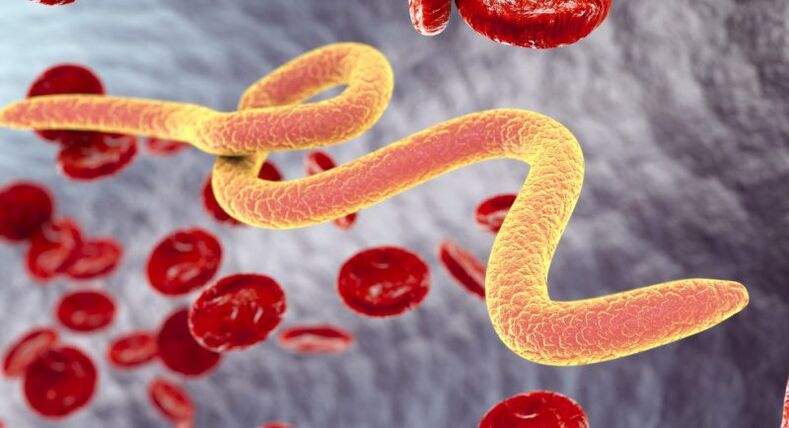Parasitic organisms are not something abstract and distant. Many people do not even think that they do not live "alone". Entire colonies of microorganisms live on the skin and inside the human body. Some of them are dangerous and harmful, while others are necessary for a healthy life and the proper functioning of the body. The normal microflorais an armor against pathogenic proliferation, beneficial microorganisms help to create the necessary acidity of the environment and participate in many chemical processes in the body. In addition to microbes, dangerous protozoa or parasitic worms can exist in the human body. As they develop and multiply, they influencenegative to human health, suppress the immune system and interfere with the smooth functioning of all systems. How to identify parasites in the human body if parasitic invasions often occur without symptoms? Often a person gets sick and pales, but does not in any way associate this with the presence of parasites.
Symptoms of a dangerous neighborhood

Parasites in the human body are in most cases small in size, they live all or part of their life cycle in the body of the host. Modern science has studied more than three hundred types of parasites that can live in the human body. Once inside, helminths affect the intestines, suppress the immune system and have a negative impact on vital organs. With timely detection of parasites and adequate treatment, serious health problems can be prevented: allergies, kidney and liver dysfunction. You can find out if there are uninvited guests in the body using modern diagnostic methods. There are a number of symptoms that indirectly indicate an infection. If you pay close attention to your health, you should notice unpleasant new changes and not ignore them. The main manifestations of parasitic infection are the following symptoms:
- A decrease in body weight, often this occurs against the background of a decrease in appetite, but often a person notices an increase in appetite while losing weight.
- The development of anemia is due to the massive infection with parasites and, as a result, the lack of nutrients in the human body.
- Poor digestion, a person notes frequent diarrhea, which alternates with constipation.
- Development of problems related to improper functioning of the digestive tract.
- Constant discomfort under the ribs on the right.
- Symptoms of arthritis, which manifests itself in the form of pain in the muscles and joints.
- Deterioration of appearance, skin lesions in the form of rashes, redness or peeling are noted.
- Increase in the number of infectious diseases due to reduced immunity.
- Allergic reactions due to poisoning with waste products from parasites.
- Deterioration of character, the appearance of irritability, aggressiveness as a result of a lack of important trace elements and vitamins.
- Decreased ability to work, feeling of constant fatigue, sleepiness.
- Sleep disturbance, reduced ability to concentrate.

The indicated symptoms are inherent in a large number of diseases, so it is impossible to say 100% that a person is infected with parasites. The diagnosis is made by a specialist after an examination.
How does parasite infection occur?
A person can become infected with parasites in different ways. Knowing the ways of transmission, you can significantly reduce the risk of contracting a parasitic infection:
Eating insufficiently processed vegetables, fruits and vegetables . A large number of parasites are transmitted to humans through the consumption of poorly processed plant foods. This happens due to transmission of infection from contaminated soil. To protect yourself, it is important to handle vegetables and fruits carefully and wash your hands before eating.Drinking dirty water . To reduce the risk of infection, it is important to drink only boiled water. When visiting developing countries, you should only drink bottled water. You can not swim in unfamiliar bodies of water, especially if there is a ban on swimming in certain water sources from the sanitary service.Consumption of semi-raw meat and fish products . There are parasites that are transmitted this way. To protect yourself, it is important to avoid eating insufficiently processed meat, eat only those products that have a quality certificate and have been tested by the sanitary services. During cooking, you must observe the temperature regime and fry (boil) the product well.Contact with an infected person . Some helminthiasis are transmitted through household contacts. The most popular group that people get infected with from a sick person are pinworms. A disease such as cysticercosis is also widespread. To protect yourself from infection, you should wash your hands before every meal or after visiting crowded places and do not eat food prepared by strangers in spontaneous markets or in questionable establishments.Contact with faeces or skin parasites of infected animals . To protect yourself, it is important to carefully observe hygiene and systematically treat your pets against fleas.

Diagnostic methods: traditional methods
The classic way to diagnose parasites in the body is stool analysis. Collect it in the morning immediately before delivery in a glass container with an airtight lid. The maximum possible period of storage of feces is no more than ten hours in a cold place. The analysis detects worms from different groups.
The most effective method is considered to be used when identifying parasites such as:
- roundworms;
- whipworms;
- tapeworm;
- tapeworm;
- randomness;
- schistosomes.
The presence of pinworms is diagnosed by itching at night. A scraping is used to diagnose enterobiosis. It is made using a special adhesive tape. The effectiveness of the technique is very high, the main thing is to perform the procedure correctly. A scraping is taken by a medical professional before washing the genitals. To get an accurate result, it is recommended to repeat the test a few days after the initial collection.
Donating feces is not always effective, some people do not like this simple procedure, considering it extremely unpleasant. For this reason, it is necessary to know how to detect parasites in other ways.
Diagnostic methods: new possibilities
If you notice the appearance of unusual symptoms, a person should visit a specialist and undergo an examination. This will help to find the source of the problem and recognize the type of helminth. There is a set of diagnostic measures that allow to accurately identify the presence of parasitic organisms, to determine their type, quantity and location.
In the past, the presence of helminths was diagnosed by taking a stool sample. The method is simple and painless, but its accuracy is low. Often the result is falsely negative and the person continues to suffer from helminthiasis or parasitic infestation. To get the most correct result, you will need to have a bowel movement at least ten times a month. Only in this case you can get an accurate answer. This is due to the characteristics of the life activity and development cycles of the parasites.

Modern medicine offers more accurate ways to identify dangerous neighbors in the human body:
Roentgen orendoscopy (biopsy) helps identify parasites in internal organs.PCR . A sample of saliva, blood or secretions is taken to determine the DNA of the parasite. The analysis allows us to determine the type (species) of the parasite.Coupled immunosorbent assay makes it possible to identify antigens. The technique allows you to get very high results. In addition to identifying the parasite, the analysis helps determine the type of parasite, the number and developmental characteristics of the pathogenic individual.Bioresonance study . The technique allows you to confirm the presence of parasites in the body, but you cannot determine its type, location or number.
Correct behavior when infected

If a person suspects that he is infected with helminths, he should not start self-treatment, he should visit a specialist. The therapist will give a referral to a parasitologist or infectious disease specialist to clarify the diagnosis. Self-medication not only turns out to be ineffective, but can also lead to a worsening of the condition.
Medicines against parasites are characterized by high toxicity and have a specific application. When diagnosing parasites, the doctor prescribes a drug that affects a certain type of helminths. Without knowing what organisms coexist with people, it is forbidden to undergo a course of therapy, taking antiparasitic drugs will not affect the problem.
Thanks to the availability of many research methods, it is possible to easily determine not only the type of parasite, but also its location and the degree of infection of the body. Do not ignore the problem, timely and competent treatment guarantees recovery without serious consequences for the body.





















